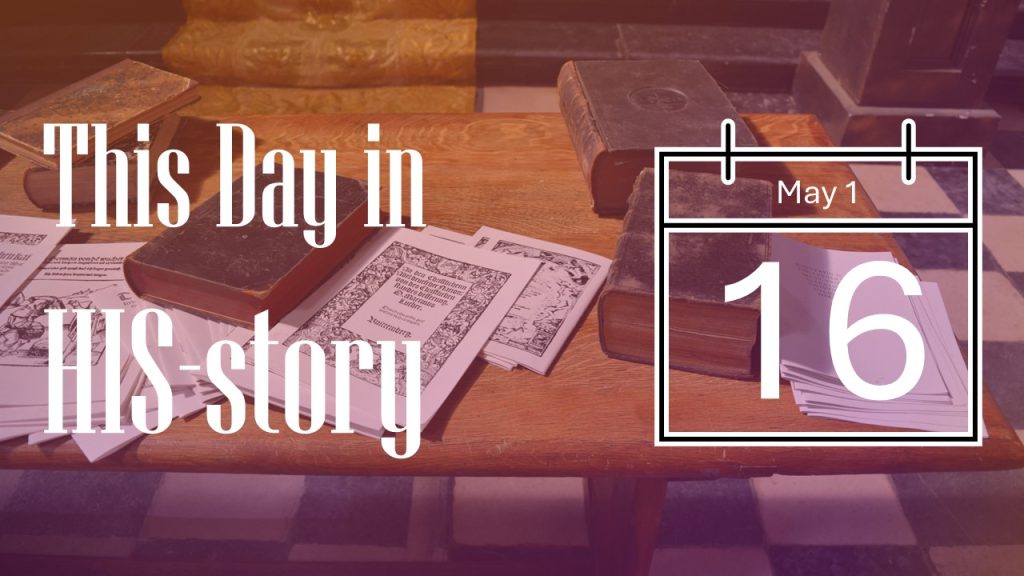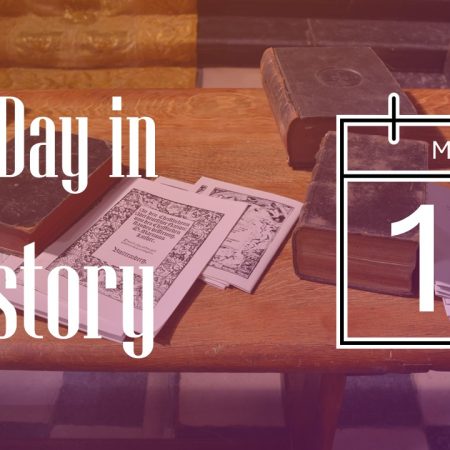
How many Anabaptists died during the sixteenth century persecution in Europe? No one knows for sure. What is certain is that at least 1,500 were cruelly tortured and killed. For the most part these were peaceful citizens who did not believe in war and who became the forerunners of today’s Mennonites and Amish. The main complaint of the authorities against them was that they did not believe infant baptism had any value. They chose to be re-baptized as willing adults.
Although no other charges were proven against them, they were sentenced to death. For the men death was usually by fire; for women it was by drowning. Many Anabaptists proved to be so bold in their final testimony for Christ that authorities began to clamp their tongues before leading them out to their execution so that they could not speak up and win more converts.
One of the Anabaptists who died in flames was Dirk Willem. His story is particularly touching, because he forfeited a real chance to escape when he turned back to help one of his pursuers.

Dirk was captured and imprisoned in his home town of Asperen in the Netherlands. Knowing that his fate would be death if he remained in prison, Dirk made a rope of strips of cloth and slid down it over the prison wall. A guard chased him.
Frost had covered a nearby pond with a thin layer of ice. Dirk risked a dash across it. He made it to safety, but the ice broke under his pursuer who cried for help. Dirk believed the Scripture that a man should help his enemies. He immediately turned back and pulled the floundering man from the frigid water.
In gratitude for his life, the man would have let Dirk escape, but a Burgomaster (chief magistrate) standing on the shore sternly ordered him to arrest Dirk and bring him back, reminding him of the oath he had sworn as an officer of the peace.
Back to prison went Dirk. He was condemned to death for being re-baptized, allowing secret church services in his home and letting others be baptized there. The record of his sentencing concludes: “all of which is contrary to our holy Christian faith, and to the decrees of his royal majesty, and ought not to be tolerated, but severely punished, for an example to others; therefore, we the aforesaid judges, having, with mature deliberation of council, examined and considered all that was to be considered in this matter, have condemned and do condemn by these presents in the name; and in the behalf, of his royal majesty, as Count of Holland, the aforesaid Dirk Willems, prisoner, persisting obstinately in his opinion, that he shall be executed with fire, until death ensues; and declare all his property confiscated, for the benefit of his royal majesty.”
Dirk was burned to death on this day, May 16, 1569. His tongue was not clamped. The wind blew the flame away from him so that his death was long and miserable. Time and again Dirk cried out to God. Finally one of the authorities could not bear to see him suffer any longer and ordered an underling to end his torment with a quick death.
1920
On this day in 1920, cabinet members and senators, foreign ambassadors and thousands of Baptists heard George Washington Truett speak from the Capitol steps in Washington, DC. The Dallas pastor took as his theme “Baptists and Religious Liberty.”

The supreme contribution of the New World to the old is religious liberty, Truett said; and in American history, Baptists more than any other group had wrestled for that liberty. He was proud of the fact that Baptists had never oppressed anyone in the name of religion.
It is the consistent and insistent contention of our Baptist people, always and everywhere, that religion must be forever voluntary and uncoerced…. God wants free worshipers and no other kind.
Persecution might make hypocrites, but it could not make Christians.
And what is the key to preserving religious liberty? Truett stressed something that lies in the power of each one of us: a holy life. Liberties cannot stand if they become license to do evil.
O my fellow Christians, if we are to be in the true succession of … those mighty days and deeds of our Baptist fathers … then selfish ease must be utterly renounced for Christ and his cause and our every gift and grace and power utterly dominated by the dynamic of his Cross.
Truett, who had been born in North Carolina in May 1867, became a Christian one evening when he was nineteen. That same night he began his evangelistic work, calling his classmates to repentance. Some listened.
Joining the Baptist Church, Truett began to teach Sunday school. When his parents moved to Texas, he went with them, and there, against his wishes, a Baptist Church at Whitewright ordained him. He did not immediately begin to pastor, but instead accepted a position as chief financial officer of Baylor University, offered to him because “people do what he asks them to do.” The school was deeply in debt. In twenty-three months, George eliminated that debt completely. Later he was offered the school’s presidency, but he turned it down, preferring to preach.
At 30, George became pastor of the First Baptist Church of Dallas, Texas. During his forty-seven years of leadership there, the church grew from an attendance of seven hundred and fifteen to over seven thousand, with latecomers regularly turned away for lack of space. Despite his conspicuous success, he almost left the ministry once, after he accidentally shot and killed one of his closest friends, a chief of police, in a hunting accident.
To the end of his life, he remained focused on his Lord, writing at seventy, “I would this day rededicate my all to Christ…”
1945
Death in England of G. Campbell Morgan, one of the great expositors of the Bible.

